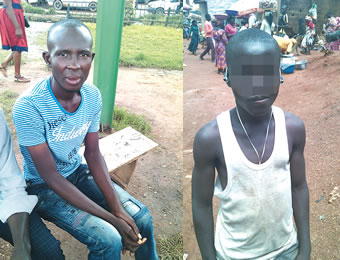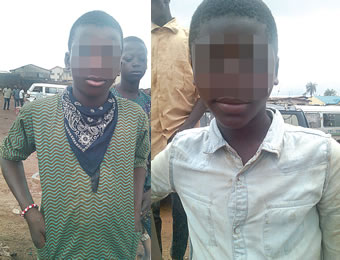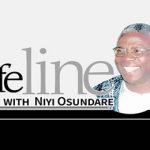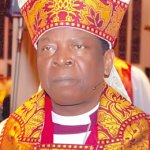In this piece, BAYO ALADE and TADE MAKINDE report on street urchins popularly known as Omo oku, loosely translated as orphans, though not all of them are, but have chosen the street life due to situations peculiar to each of them.
IWO road area of Ibadan, Oyo State, is very known to most residents of the city. It is the Oshodi (Lagos) of Ibadan. It is made more popular by its motor parks and more importantly, its touts, thugs and street urchings.
Sunday Tribune went in search of a group of street boys called Omo oku, loosely translated as ‘children of the dead’ or better still, orphans. We were trying to ask around when we came in contact with a young man, himself a former Omo oku. His name is Sina Akinfenwa. He was 12 years old when he left home after his father, Wahidi Akinfenwa, had a misunderstanding with his mother, Fatimo.
“My father is from Oranyan area of Ibadan and my mother is from Odo-Oba. I was a bus conductor until I was able to drive. In 2002, when I wasn’t making enough money, I left for Lagos where I was a bus conductor to a man who plied Orile-Oshodi-Ijora and Idumota. I lived in Ketu then and I still have my own people there till now,” he said of his early days of struggle.
After making some money in Lagos, he came back to Ibadan. At 30, he felt he needed to get married and doing that in Lagos would not be a smart move, financially-speaking. Now with three kids, and the money not coming as it once used to, Shina, speaking on behalf of his mates, Tunde Adebisi, Adekunle Adewole and Yusuf Fatai, awaits the arrival of God-sends in the mould of a popular Ibadan politician, Seyi Makinde, who is reportedly empowering the underprivileged by giving them Micra cars which they often pay for instalmentally with little interest.

“I have seen it all and I can tell you that there is no dignity in servitude. We serve others and yet, we are never free,” Shina said, referring to those in the car hire business who exploit would-be car owners.
“We are never able to complete payment for cars bought from them on hire purchase. To buy a Micra car is N1 million. We are to pay back N15,000 every week. Any week you fail to make the payment, the car will be repossessed. Even if you have paid N999,000 and you are in your last week, they won’t pity you. For how long could one continue to do this?
“Go to the car park over there. You will see many teenagers who are struggling to survive. I was once like them. I had no home to sleep in, no food to eat, until I found my way to Iwo Road garage. Now, I have become a senior Omo oku and can’t be pushing wheelbarrows again. We have left that for the young ones,” he said.
At the Iwo Road, garage where the omo oku are domiciled, it is a jungle where only the fittest survive. As Sunday Tribune entered the motor park, many of them were seen fighting over customers. It is often a fight to survive, to keep hunger at bay. Surprisingly, even within the park, the young boys have bills to pay — bills to “higher authorities.’’ The higher authorities in this sense are the bigger boys whom the omo oku dare not challenge. There is One Mopol, Alaga and Ope whom they must pay N50 each per day in order to keep working in the park. Any form of contravention of the laws of the “powers-that-be” may see the young boys thrown out.
“That is our lot every day. We fight to get customers; we fight because we have bills to pay,” Abiodun Rasaki, an Omo oku, told Sunday Tribune.
Looking at Biodun, one would assume he is also a teenager like the others. It was a surprise when he declared that he was 35. He has been pushing wheelbarrow at the park for the past five years.
He trained to be an auto electrician. When it was a few months away from being on his own, his master travelled. Since there was no one to formally send him off, he had to complete the remaining six months at another master’s workshop. After six weeks with his new boss, he was told he would not be set free until after another year.
“I couldn’t wait that long again. That would mean I would have spent two and a half years for what shouldn’t have taken me more than a year,” he said in frustration. Thereafter, Biodun left for Lagos. He was in his 20s then. In Lagos, he washed cars for a living at Ile Epo Oba, Ikorodu.
“The water bleached my legs. I couldn’t risk losing my legs, so I quit the job and came back to Ibadan,” he said.
On return to Ibadan, the park was the only place he could find immediate succour, working as a porter.
“All I needed was N300 to rent a wheelbarrow each day and the rest of the money made with it is mine,” he said noting that sometimes, he makes as much as N1,000 and sometimes, more than that. But he has to fight to make the money anyway, which he often spends on food. This wasn’t the life Biodun wanted; he preferred a better life.
“I get called to wash clothes, cut grasses, wash cars and lay bricks most weekends by those who know and trust me. If I had a better option today, I would leave this job. It is demeaning, but there may not be an escape route because most of us lack education, a basic credential as far as the society is concerned. Jobs like this are only fit for the uneducated ones,” he told Sunday Tribune.
Iyanu Bankole is also an Omo oku. He is the hip-hop artiste, the Dagrin of the motor park. Initially he was shy about owning up to his raw talent, but when he was spurred on by his mates and Sunday Tribune to sing, it was a surprise. Amazingly, he went on and on with his captivating lyrics which he must have written in his head, singing of inequality and lack of justice in the system.
He was in Primary Six at a private school in Iwo Baale area of the city, then his father stopped paying for his education and took him to a welder. He didn’t like this, but he had no choice than to take up the only offer his father had for him.
“He made it clear that he couldn’t fund my education again. After two months of being an apprentice welder, I left Iwo Baale for this park. I can sing, even better than most of those making it out there through music,” he said.
There are two categories of omo oku working in the park: those who use wheelbarrows and those who carry goods on their heads. Iyanu prefers to use his head. That only costs him N150 each day instead of N300. He doesn’t have to queue for customers. All he needs is to verbally woo his potential customers, but as in a jungle it is survival of the fittest.
“It is turn-by-turn. But most want to jump queue by running after prospective customers once they alight from a bus. It was not like that before. But now that the number of displaced teenagers has grown in leaps, it is survival of the fittest.
“If you are not street wise, someone will take your customer and you will have to go back behind the line if the next guy won’t allow you pick the next customer.
“All I need is N150 to begin work daily. The money will be shared equally among Aunty Ope, One Mopol and Alaga. Once I settle with them, (they control this garage), then I can go to my business. I don’t hire wheelbarrows. I can do with the N150 that I will be saving for myself for using my head to carry goods. Besides, I hate pushing barrows because I am not that strong,” he stated.

Iyanu wants to return to school. He believes he can still cope with the academic rigours despite having left the school system for almost a decade. “Better still, let someone help me with a real vocation that I can be trained on,” he pleaded
The Omo oku story is a long one. Another one, Emmanuel Ezekiel, lost his mother a few years ago and his father remarried. Unfortunately for him, his father shuttles between Akure and Ibadan on business trips, but at the home front, his father’s new wife has made life unbearable for him. Surprisingly Emmanuel attends a private school but finds himself among the omo oku of the motor park. Going home does not appeal to him, he prefers the company of his friends but he still goes home, once in a while.
“My stepmother treats me harshly. I prefer staying under the bridge to going home because my father stays more in Akure. I only go home when he is around. He doesn’t look for me and I don’t bother much about him.
“Initially, my father was worried about me for not coming home. He eventually heard that I now work as a wheelbarrow pusher at this garage and came to see me one day. Since he was convinced I was doing good, he stopped checking,” Emmanuel said.
Though he is also eager to go back to school, he knows too well that he can’t do so on his own. After all, what he makes at the park on a daily basis could only feed him.
Unlike many others, Emmanuel is lucky to have found favour with soldiers who keep watch at a shopping plaza opposite the garage.
“They (the soldiers) allow us to sleep close to them. When it is around 5.00 a.m every day, they wake us to sweep the entire area. It is better than the condition of some of us who sleep in the open and are beaten by rain or pay somebody for a space to sleep,” he told Sunday Tribune.
The story of Timilehin is equally pathetic. He was a JSS 1 student of a private school at Abodo, Olodo area of Ibadan. His father was Igbo, a driver. During one of his trips to the northern part of the country, he had an accident and died. Home was not what it should be, so he joined fellow Omo okus two months ago.
Like his peers, he continues to struggle, hoping that one day things would get better. But meanwhile, like others he keeps himself happy playing football and craving for fame and hoping to become another football star.
As Sunday Tribune began to leave, it noticed some boys at the far end of the park smoking. The boys belong to the group of Omo oku but would only join the others when they had had enough of the smoking.






